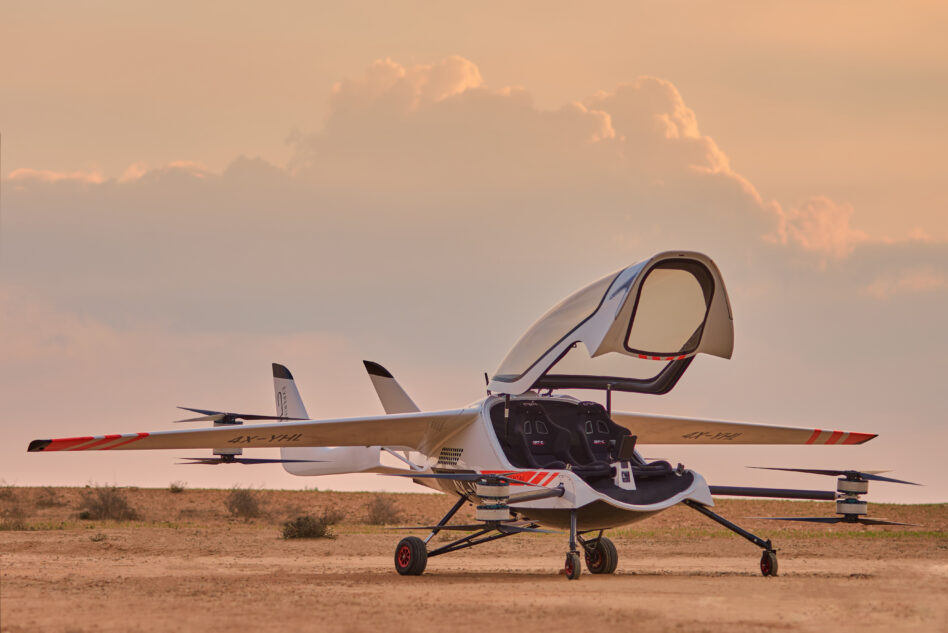Everyone loves a tiny little plane. Yesterday, Israeli eVTOL (electric vertical takeoff and landing) startup AIR announced a $23 million Series A, led by Entrée Capital with participation from Dr. Shmuel Harlap. The company says it will use the funding to ramp up production and expand its U.S. operations—especially given how keen the Trump administration is on eVTOLs.
Small but mighty: We’ve covered eVTOLs before—they’re small-ish electric planes that can take off and land in an area about the size of a helipad. They’re all the rage for personal transport (who likes traffic, anyway?) but also super useful for situations that call for a sneaky entrance or exit (think infil/exfil or frontline resupply).
AIR—founded in Israel in 2017 by Chen Rosen, Netanel Goldberg, and Rani Plaut—produces eVTOLs for unmanned cargo missions as well as a two-seater model for crewed flight, called AIR ONE. Plaut, now CEO, told Tectonic the company was born out of a mindset borrowed from the automotive world: They wanted to build a plane simple enough for just about anyone to fly, anywhere.
“Aviation, it is still a niche,” Plaut said. “A pilot is considered a very high skill set person, while…I’m just a dude with a car.”
Pick your flavor: AIR ONE is aimed at personal aviation (which is hugely popular in the U.S.) while the unmanned cargo version has gained traction with defense customers. Plaut said an American general compared it to an “aerial humvee”—a straightforward, rugged, modifiable cargo-mover that takes humans out of risky logistics missions in contested environments.
“Normally, when you move something in a contested environment, you say, ‘Okay, let’s make a convoy.’ A convoy is two trucks and six Humvees, or Jeeps, or Land Cruisers, and 16 people with rifles to defend them,” he said.
That’s expensive—and dangerous. AIR’s aircraft is designed to get humans out of these risky logistics situations. The unmanned cargo plane:
- Is built for “cargo delivery, disaster response, contested logistics, and remote access operations.”
- Has a 33-foot wingspan, according to Plaut.
- Can travel about 100 miles at 120 knots.
- Has a 550-pound payload capacity and 70 cubic feet of cargo space.
- Runs on bespoke AIR avionics software, paired with off-the-shelf automation tools.
- Is “largely automated,” but keeps a human in the loop.
Both the cargo aircraft and the two-seater have folding wings, meaning they can park in a standard-sized parking space. The two models are roughly 90% the same, Plaut said—except where the manned version carries two people, the unmanned version carries over 500 pounds of kit.
Seal the deal: Cost-wise, Plaut said the piloted version “will come to a few hundreds of thousands of dollars on the low range.” The defense-focused cargo variant can run anywhere from a few hundred thousand to $1–2M depending on added capabilities like sensors.
AIR says it has “successfully demonstrated all phases of flight with its full-scale platform, including extensive nighttime Beyond Visual Line of Sight (BVLOS) autonomous, uncrewed cargo operations.” It’s also working with the U.S. Air Force’s Agility Prime program and Israel’s Ministry of Defense.
The company delivered its first aircraft to a “logistics customer” in 2023 and plans to deliver 15 more cargo planes this year. It also says it has more than 2,500 pre-orders for the personal transport version.
Star-spangled: The hype around these little electric aircraft has been building in Washington. In June, President Trump signed an executive order calling for a production ramp-up of supersonic tech and drones—including eVTOLs.
The order created “a pilot program testing flying cars, also known as electric vertical take-off and landing (eVTOL) aircraft, for EMS, air taxis, cargo, and defense logistics,” and directed the FAA to expand certification pathways for these aircraft.
AIR is still in talks with several U.S. states to determine where its American production plant will go, but Plaut said it already has personnel—and a plane—in Florida. With the new funding, the company plans to grow its 50-person team by 20 to 30, mostly in the U.S.

